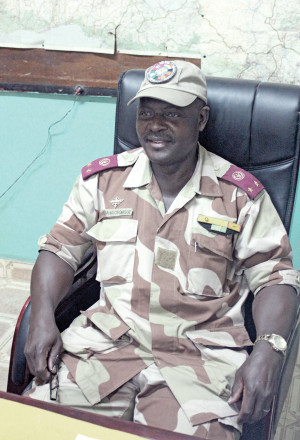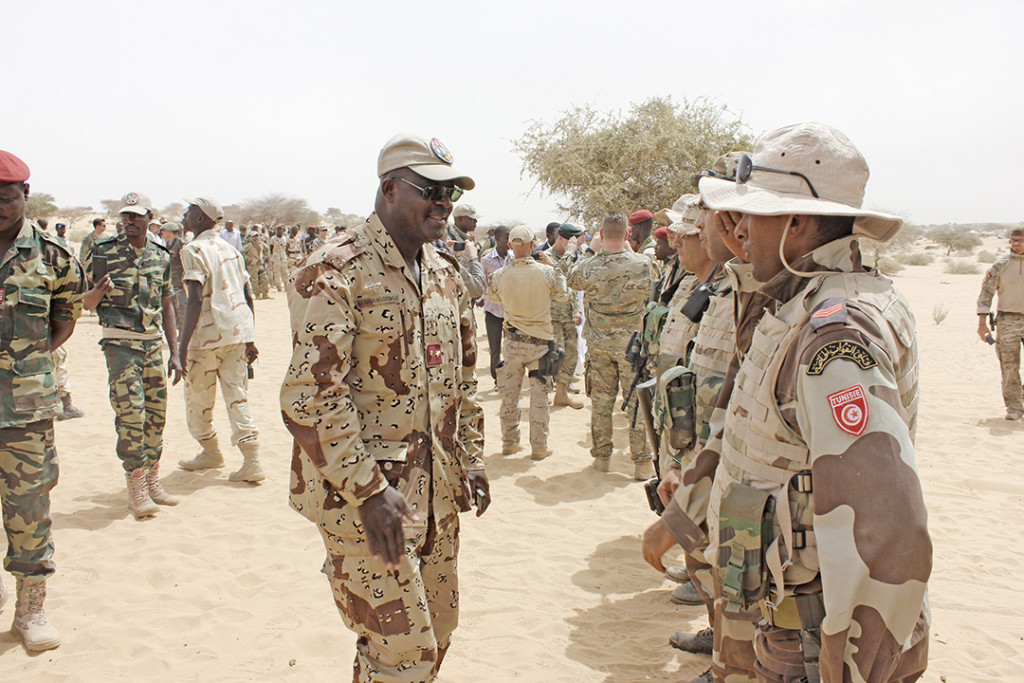The director of Flintlock 2015 talks about leading a military exercise with multiple armies and modern technology.
Chadian Brig. Gen. Zakaria Ngobongue served as the director for Exercise Flintlock 2015, with Chad as the host country. He is commander of his country’s Joint Military Group of Schools. Although he has participated in several multinational military exercises, this was his first Flintlock. Africa Defense Forum interviewed the general twice at a camp near N’Djamena in the final days of the exercise in March 2015. The general spoke in French, with an English translator. These are excerpts of those interviews:

Q: It’s interesting that this is your first Flintlock, and yet you are in charge.
A: Yes, as main director of Flintlock 2015, I play the role of coordinator. This is my first Flintlock, but I have participated in numerous multinational and multidimensional exercises. In Angola in Exercise Kwanza in 2010, I was the commander of multinational forces. This was an exercise with 4,000 men underneath me. In 2014, I had command and control for an exercise in Tanzania. Also in 2014, I participated in another exercise, Loango, in the Republic of the Congo.
In all of these different exercises, all are diverse. Flintlock is very focused on communication and sharing. That would be one thing that sticks out about this exercise — being able to exploit the high technology and communications equipment. In a lot of the other exercises, the communications equipment is not interoperable among the participating countries. That always creates a difficulty with the exercise. This exercise focuses more on the interoperability. But when it comes right down to it, maneuvers are maneuvers; they’re the same.
As for the rest, there’s always parachutes, supply and resupply drops, checkpoints and securing zones. It all builds up to a final exercise and demonstration. That is the same in every exercise.
Q: It has been an ongoing concern in years past
that in military exercises, the participating countries often had radio systems that were incompatible with each other. Did the use of cellphones make a difference this year?
A: Look at the realities in the theater. Yes, we have antennas; yes, we have different ways of transmitting information. And yes, the cellphone is now another quite useful tool. But when it comes right down to it, it all comes down to human contact in some way. As a man in the field, when we’re stuck, we’re going to deal with it with the means we have.
Q: Boko Haram fighters are known to be close to here. Did the presence of Boko Haram change the exercise in any way?
A: No, this didn’t have an effect. This exercise was planned for a long time. They came up with the concept of operations that were planned for this exercise. So, it’s a simple coincidence.
All of these events were happening between February and March. Historically, this is when Flintlock is scheduled. It’s just a simple coincidence that this was when Boko Haram started to act up. It had no effect on us going about our exercise. Except, of course, the fact that this exercise takes place now in a more particular context. Yes, we have the context of a high visibility of certain actions conducted by Boko Haram; they have sown terror. They have sown disorder everywhere, especially in the subregion. But this exercise still gave us the proper occasion to get together and prepare together.
Q: There seems to be a real emphasis on participating countries working together.
A: Flintlock pulled us together; it gave us time together. Why is this important? This is a warmup — this is a warmup to deal with the reality we will have to deal with. The exercise didn’t change; the context of the exercise did. It was a perfect warmup for real, live operations.
Q: By “live operations,” you mean dealing with extremists?
A: Terrorism — it’s not a case for just one country. Terrorism has no face; it has no territory. It has no boundaries. It has no friends. This requires everyone to share the resources. We have to put our efforts together. We can all fight this together. Alone, we will never attain the state that we wish. It’s going to require working together.
It’s about our fundamental mission. The fundamental mission of a country and its armed forces is to protect the civilians on a long-term basis, to give them a secure environment. It’s to give stability to our borders and what happens inside them. If Boko Haram or any other one rips the integrity of our nation, of our security, how can we ignore this? If someone comes in and attacks our population, our response will be measured and appropriate to that threat.
Q: In 2013, your country made headlines around the world by sending troops to Mali to help fight al-Qaida-linked fighters. Is that the kind of international cooperation you’re talking about?
A: Our goal is to have an entire African continent that’s stable. It’s not just Chad, it’s our continent. Yes, we are committed to sending our troops to help our brothers. It has nothing to do with whether it’s Mali or another country. Terrorism has no face, and it has no boundaries. This is not just a limited, one-country issue. We are not a superpower. We are working among our brothers.
Q: Is Flintlock training mostly to prepare for asymmetric warfare?
A: Flintlock has definitive objectives. The first one is a mutual sharing of resources and to have a synergy together. These mutual resources were to activate, put into action, and improve and reinforce interoperability. As you know, when you get this many people together, they all come with different insights and different experiences. And you get them together, and you mutually share. It’s these differences and principles and values we have, our know-how, our culture, and our identity, all of this together. And if you now keep in mind, we’ve talked about elements of the exercise, but there’s another aspect of Flintlock that can’t be forgotten: It’s the humanitarian, the medical element. Civil-military actions. That was another thing that was concentrated on.
So we are responsible for protecting our citizens, and what is important when you are protecting citizens is also to strengthen the connection and the links between us and civilians. We need civilians to know that we are here and for them to be reassured of what our real role is.
Q: A couple of the themes of this year’s Flintlock seem to be practice, as in firearms training, and adaptability, such as new communications technology.
A: Soldiers need constant practice. They need to practice every day. Flintlock is a great framework for our training, to get all together, to adapt new techniques. Technology advances quickly. Terrorists are constantly changing their modes of action. We must have new operational actions. All of the armed forces should be interested and involved in this.
Q: Tell us about the type of extremists you are using in your training scenarios.
A: It’s Boko Haram and other terrorists. Their source of recruitment is the population. What sort of population are we talking about? The poverty-ridden. The minors. People who have had a difficult life. Yes, these are the people that they target. They also tend to look for a certain age range — always the young. Why? Financial means. These young people don’t understand the stakes. They don’t understand the dangers. All they are looking for is right in front of their noses at easy streets.
Q: Do you think the lessons learned at Flintlock will help improve intelligence sharing in the region?
A: Something that’s fundamental in the fight against terrorism is this information-sharing — it’s essential. If we don’t share information, we’re never going to get to our final stage. Flintlock is exactly what we needed, the right time and place, together. We share information and put into practice this sharing of information. As you’ve noticed, Boko Haram is in the subregion, and if we’re going to fight against this, this sort of exercise that we just did is a perfect concrete example of what we need to do more of in the future.
If you look at, in the framework of this exercise, within the coordination center, there were two cells, the cell to deal with Boko Haram, and the one for al-Qaida in the Islamic Maghreb. These two cells with their work communicate among themselves, but not only among themselves. There was also a direct connection with national coordination centers, for example in Niger, Tunisia and Cameroon. In the framework of the exercise, there was communication, concrete communication. At the same time, it was sometimes exploited for the reality of what was taking place in the subregion. Just to give you a concrete example, the events that you saw on TV in Dikwa in Nigeria [Nigerian and Chadian forces recaptured the town from Boko Haram], that information sharing happened in real time during the exercise itself.

